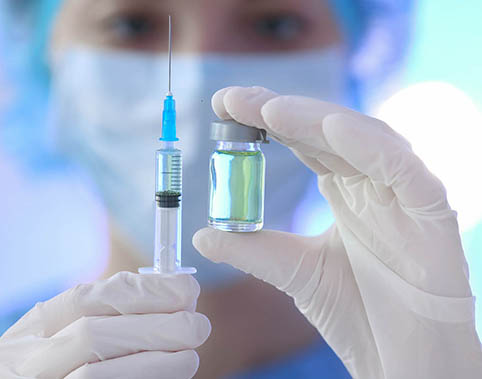
Photo: Deposit Photos
Curious about how mRNA vaccines and other types of COVID-19 vaccines can help you develop immunity to the COVID-19 virus?
Understand how different technologies work with the immune system to provide protection.
A coronavirus disease 2019 (COVID-19) vaccine can help you develop immunity to SARS-CoV-2, the virus that causes COVID-19, without getting ill. But how exactly do the different types of COVID-19 vaccines work?
Following is information from The Mayo Clinic:
Vaccines prompt an immune response so that your body remembers how to fight a virus in the future. Some vaccines use a whole virus to cause your immune system to respond. Other vaccines use parts of the virus or genetic material to make specific proteins like those in the virus.
Many COVID-19 vaccines involve a spikelike structure on the surface of the COVID-19 virus called an S protein. The S protein helps the virus get inside your cells and start an infection.
Manufacturers around the world are working on different types of vaccines. The main types of COVID-19 vaccines currently available in the U.S. or large-scale clinical trials include:
Messenger RNA (mRNA) vaccine.
This type of vaccine uses genetically engineered mRNA to give your cells instructions for making a harmless piece of the S protein found on the surface of the COVID-19 virus.
After vaccination, your immune cells begin making the S protein pieces and displaying them on cell surfaces. This causes your body to create antibodies. If you become infected with the COVID-19 virus, these antibodies will fight the virus.
After the mRNA helps your cells make the protein pieces, the mRNA is immediately broken down. It never enters the nucleus of your cells, where your DNA is kept. Both the Pfizer-BioNTech and the Moderna COVID-19 vaccines use mRNA.
Vector vaccine.
Genetic material from the COVID-19 virus is inserted into a different kind of weakened live virus in this type of vaccine, such as an adenovirus. The weakened virus (viral vector) serves as a delivery system. When the viral vector gets into your cells, it delivers genetic material from the COVID-19 virus that gives your cells instructions to make copies of the S protein.
Once your cells display the S proteins on their surfaces, your immune system responds by creating antibodies and defensive white blood cells.
If you become infected with the COVID-19 virus, the antibodies will fight the virus. Viral vector vaccines can’t cause you to become infected with the COVID-19 virus or the viral vector virus. Also, the genetic material that’s delivered doesn’t become part of your DNA. Johnson & Johnson, AstraZeneca, and the University of Oxford, are working on viral vector COVID-19 vaccines.
Protein subunit vaccine.
Subunit vaccines include only the parts of a virus that best stimulate your immune system. This type of COVID-19 vaccine contains harmless S proteins. Once your immune system recognizes the S proteins, it creates antibodies and defensive white blood cells. If you become infected with the COVID-19 virus, the antibodies will fight the virus. Novavax is working on a protein subunit COVID-19 vaccine.
In the U.S., the U.S. Food and Drug Administration has given emergency use authorization to the Pfizer-BioNtech and Moderna COVID-19 vaccines. More types of vaccines are expected to be authorized for use in the coming months.
A COVID-19 vaccine might prevent you from getting COVID-19 or from becoming seriously ill or dying due to COVID-19. Consult your local health department for the latest information on how and when you can receive a vaccine.
___________________________________________












